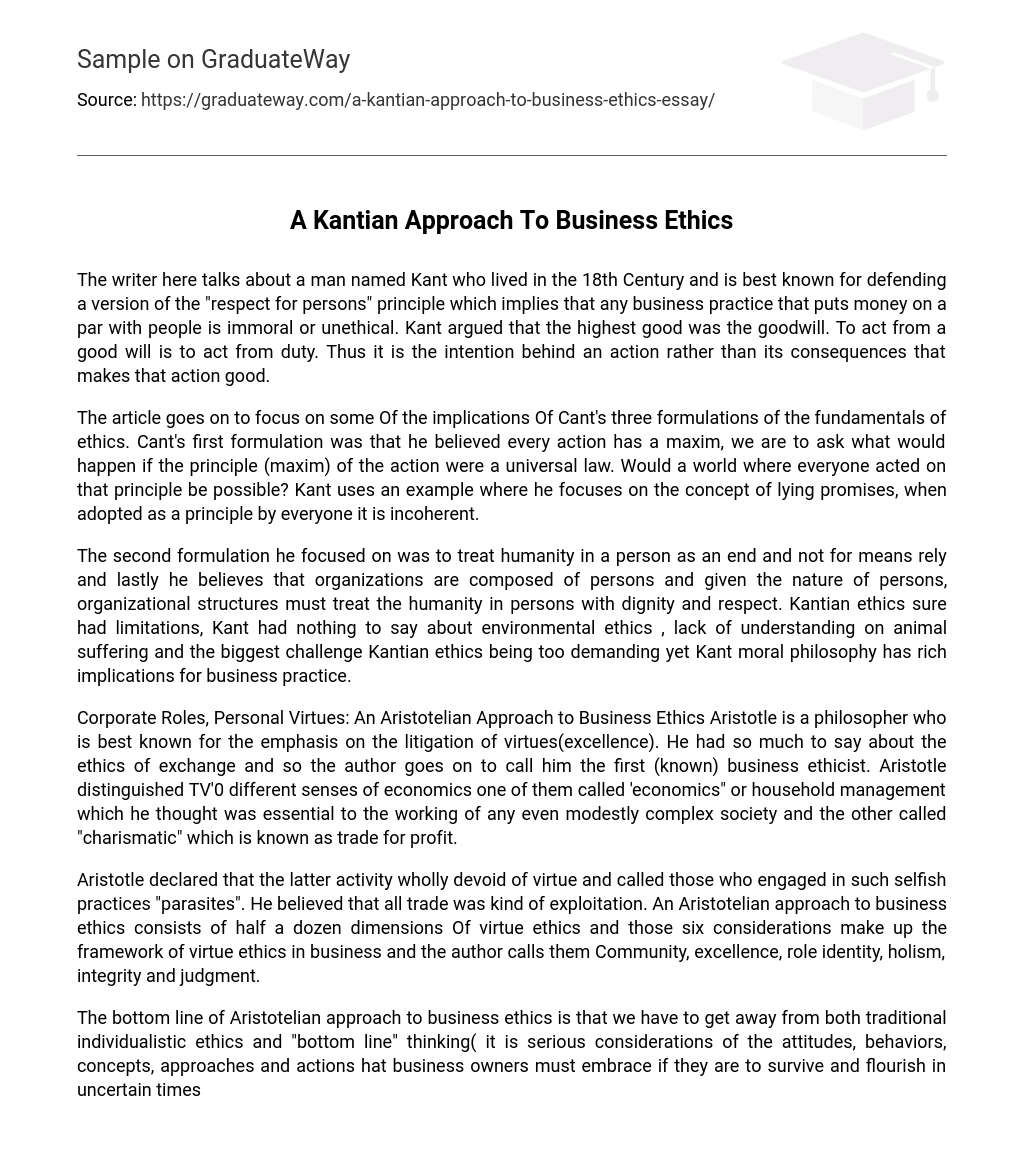The author discusses Kant, a man who lived in the 18th Century and is renowned for his defense of the “respect for persons” principle. This principle entails that any business practice that prioritizes money over individuals is morally or ethically incorrect. Kant contended that the greatest good was goodwill, and acting with a good will means acting out of duty. Therefore, it is the intention behind an action, rather than its outcomes, that determines its goodness.
The article discusses the implications of Cant’s three formulations of the fundamentals of ethics, focusing on his first formulation. Cant believed that every action has a maxim, and we should consider what would happen if the principle (maxim) of the action were a universal law. Kant provides an example of lying promises to show that a world where everyone acted on this principle would be incoherent.
One aspect that the author focused on was the treatment of humanity in individuals as an end and not as a means. Additionally, they argued that organizations are made up of people, and therefore must treat the humanity in individuals with dignity and respect. Kantian ethics, however, had certain limitations. Kant did not address environmental ethics or have a comprehension of animal suffering. Furthermore, Kantian ethics can be seen as overly demanding. Nevertheless, Kant’s moral philosophy has significant implications for business practice.
Corporate Roles, Personal Virtues: An Aristotelian Approach to Business Ethics Aristotle is renowned for his focus on the cultivation of virtues (excellence) in his philosophy. The author acknowledges his significant contributions to the field of business ethics and refers to him as the first known business ethicist. Aristotle identified two distinct senses of economics, referring to one as “economics” or household management, which he deemed fundamental to the functioning of even moderately complex societies, and the other as “charismatic,” which signifies trade for profit.
According to Aristotle, engaging in selfish practices and trade is devoid of virtue. He referred to those involved in such activities as “parasites” and believed that all trade is a form of exploitation. An Aristotelian perspective on business ethics encompasses six dimensions of virtue ethics: community, excellence, role identity, holism, integrity, and judgment. These considerations form the framework of virtue ethics in business.
The Aristotelian approach to business ethics emphasizes the need to move away from traditional individualistic ethics and solely focusing on profit. This approach highlights the importance of considering attitudes, behaviors, concepts, approaches, and actions for business owners to thrive in unpredictable times. Essentially, it emphasizes that prioritizing people over profits is crucial for success.
MAHAYANA-01 Utilitarianism and Business Ethics: The article advocates for the utilitarian approach to business ethics, which is already widely used in this field. Utilitarianism offers a decision-making framework that prioritizes the benefit of society, encouraging ethical behavior in businesses. The author incorporates the perspectives of renowned philosophers Jeremy Beneath and John Stuart mill.
Bantam’s utilitarian ethics were grounded in the concept of greatest happiness being agreed upon by individuals. The author argues that the primary reason for the disregard of the utilitarian approach is due to unfounded criticisms. In this piece, the author defends utilitarianism as a foundation for business ethics, addressing various criticisms prevalent in the literature on business ethics. The aim is to demonstrate that relying on John Stuart’s philosophy can provide a reliable business ethics approach.
According to Mill’s utilitarianism, principles like justice are supported and the minority is not favored. This view is considered more reasonable compared to other views, such as Kantian, when making decisions in business and dealing with workers. The author also explores the moral motivation of utilitarianism and employs a satisfying theory to defend utilitarian business ethics against criticisms regarding the study of change within utilitarianism. It is commonly stated that business has a utilitarian nature.





